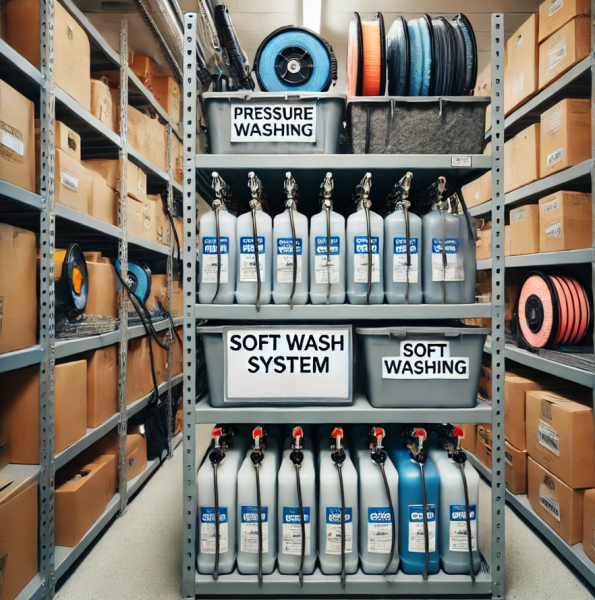Guide to Choosing the Right Cleaning Chemicals for Your Needs
Why Selecting the Right Cleaning Chemicals Matters
Choosing the right cleaning chemicals is essential for maintaining a safe, efficient, and compliant work environment. Whether you're handling exterior house washing, commercial sanitation, or industrial cleaning, selecting the appropriate solutions improves cleaning effectiveness, extends equipment lifespan, and ensures workplace safety.
With a vast range of OSHA-approved degreasers, EPA-compliant disinfectants, and eco-friendly cleaning solutions available, knowing which products best suit your needs can be challenging. This guide will help you navigate the selection process, ensuring that you invest in the best pressure washing chemicals, industrial detergents, and multi-surface cleaners for your business.

1. Identify Your Specific Cleaning Needs
Before purchasing commercial cleaning chemicals, it is crucial to assess the specific contaminants and surfaces you need to clean. Different cleaning tasks require targeted solutions, including:
Heavy-Duty Degreasers for Machinery and Exterior Surfaces
- Designed for driveways, equipment, siding, and tools.
- Effectively removes oil, grease, and industrial buildup.
Disinfectants for Commercial Spaces and Food Service Areas
- EPA-registered disinfectants eliminate bacteria, viruses, and pathogens.
- Necessary for restaurants, offices, healthcare facilities, and high-traffic areas.
Rust Removers for Metal Maintenance
- Prevents corrosion and oxidation on buildings, outdoor structures, and tools.
- Extends the lifespan of metal components.
Multi-Surface Cleaners for General Maintenance
- Suitable for windows, walkways, walls, and floors.
- Available in biodegradable and non-toxic formulations.
For a comprehensive cleaning regimen, businesses should consider a combination of these cleaning solutions.
2. Ensure Compliance with Safety and Regulatory Standards
Working with commercial and industrial cleaning chemicals requires adherence to strict safety regulations. To maintain compliance and protect workers, businesses should:
- Review Safety Data Sheets (SDS) to understand chemical hazards and safe handling procedures.
- Ensure products meet OSHA, EPA, and industry-specific environmental regulations.
- Train staff on proper storage, handling, and disposal practices.
For businesses in highly regulated industries, selecting OSHA-approved degreasers and EPAcompliant disinfectants is essential.
Related Resource: Guide to OSHA-Approved Cleaning Solutions
3. Choose the Right Chemical Strength and Formulation
Cleaning chemicals vary in concentration and composition. The right choice depends on cleaning efficiency, surface compatibility, and cost-effectiveness.
Concentrates vs. Ready-to-Use Products
- Concentrated cleaners allow for customized dilution and offer better value over time.
- Ready-to-use products provide convenience and reduce preparation time.
Understanding pH Levels
- Acidic cleaners are ideal for removing mineral deposits, rust, and limescale.
- Alkaline cleaners break down grease, oil, and organic buildup.
Eco-Friendly Formulations for Sustainable Cleaning
- Biodegradable and non-toxic options reduce environmental impact.
- Best suited for residential pressure washing and businesses prioritizing green cleaning.
Businesses cleaning sensitive areas, such as schools and healthcare facilities, should opt for low-VOC, non-toxic solutions.
4. Verify Surface and Equipment Compatibility
Using the wrong cleaning agent can cause surface damage or void equipment warranties. Always check manufacturer recommendations to ensure compatibility.
Best Practices for Safe Cleaning
- Avoid acidic cleaners on marble, untreated wood, and delicate materials.
- Use non-corrosive solutions for pressure washers and soft-wash systems.
- Choose low-residue cleaners for food prep areas and commercial kitchens.
Related Resource: How to Protect Your Equipment from Chemical Damage
5. Maximize Cost Efficiency Without Compromising Performance
When evaluating cleaning chemicals, price alone should not be the deciding factor. Consider:
- Dilution Ratios: High-quality concentrated cleaners require less product per use, offering long-term savings.
- Application Methods: Sprays, foams, pressure washing concentrates, and bulk liquids provide different levels of efficiency.
- Shelf Life & Storage: Some products have a longer shelf life, reducing waste and replenishment costs.
Investing in high-performance industrial cleaning solutions improves efficiency while reducing overall chemical waste.
6. Implement Proper Safety Measures and Employee Training
Key Safety Practices for Cleaning Professionals
PPE and safety accessories complement cleaning chemical lineups, ensuring a safe and efficient work environment.
- Provide PPE (gloves, goggles, respirators) for chemical handling.
- Label and store chemicals according to OSHA and EPA guidelines.
- Train employees on proper dilution techniques and spill response procedures.
Related Resource: Workplace Safety Guide for Cleaning Professionals
Common Mistakes to Avoid When Choosing Cleaning Chemicals
Even experienced professionals make mistakes when selecting and using cleaning solutions. Here are some common pitfalls: Even experienced professionals make mistakes when selecting and using cleaning solutions. Here are some common pitfalls:
- Mixing Incompatible Chemicals - Can create toxic fumes or hazardous reactions.
- Using the Wrong pH Level - May cause surface damage or ineffective cleaning.
- Skipping Protective Gear - Increases the risk of chemical burns, respiratory issues, and skin irritation.
- Following manufacturer guidelines and investing in proper safety training helps businesses avoid costly mistakes.
Frequently Asked Questions (FAQs)
- What are the best chemicals for exterior house washing?
For residential cleaning, biodegradable soft-wash solutions, bleach alternatives, and low-VOC detergents effectively remove dirt, mold, and mildew without damaging landscaping. - Can industrial degreasers be used for residential cleaning?
Most heavy-duty degreasers are too strong for home use. Homeowners should use dilutable formulas or eco-friendly alternatives for safe application. - How should cleaning chemicals be disposed of safely?
Businesses should follow local hazardous waste disposal guidelines or return unused products to suppliers when applicable.
Find the Right Cleaning Solutions for Your Business
Choosing the right cleaning chemicals ensures efficiency, compliance, and workplace safety. Whether you need industrial degreasers, EPA-approved disinfectants, or multi-surface cleaners, making an informed decision improves operational effectiveness.
For high-quality pressure washing solutions, commercial cleaning products, and industrial maintenance supplies, visit LNI Equipment to explore our extensive catalog.
